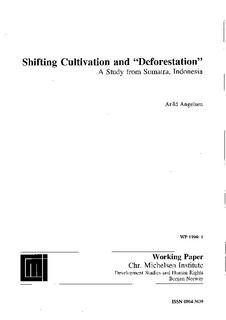Shifting Cultivation and "Deforestation". A Study from Sumatra, Indonesia
Abstract
About half of tropical deforestation is commonly explained by the expansion of traditional agriculture (shifting cultivation). This article first questions the share of responsibly assigned to traditional agriculture. Secondly, a simple framework based on a theory of land rent capture is developed to explain agricultural expansion. The framework is applied in the study of recent changes in shifting cultivators' adaptations in a lowland rainforest area in Sumatra, Indonesia. Increased rubber planting and expansion into primary forest are seen as a response to increased rubber profitability and (expected) land scarcity, and as a race for property rights. Government land claims have been important in initiating a self-reinforcing land race, and have therefore significant multiplier effects on forest clearing.
Publisher
Chr. Michelsen InstituteSeries
CMI Working paperWP 1994: 1
